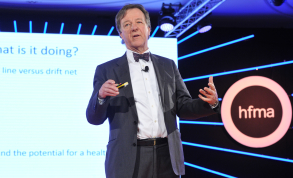HFMA 2018: social prescribing set for major role
NHS England’s national champion for social prescribing said that primary care would become more psychosocial and community-based and much less biomedical. ‘Social prescription also links the health service to community resources and makes patients and communities assets in their own health and wellbeing,’ he said. ‘That’s important ideologically, but also very important for the bottom line in terms of the sustainability of the health service.’
Dr Dixon said that social prescribing would meet the needs of the 20% of patients that come to see him with a social problem. But it is also, albeit less intuitively, for those patients using hospital services most and for those with the greatest health risks.
It is a simple idea involving a prescriber, a link worker and a menu of activities. Initially the prescriber is likely to be a GP, but in future it could be a consultant or an occupational therapist or even the patients themselves. ‘The link worker is absolutely a crucial part of it,’ he told the conference in one of a number of rapid, short presentations. ‘They are non-clinical, often with motivational training and their job is to perhaps spend half an hour with a patient and get under their skin to understand what motivates them and how they can help them to a stage where they can be helped or help themselves. And they might take the patient to their first activity.’
Activities could include an art or singing group, exercise, yoga, theatre – or any other type of activity that could benefit the patient. And in many places these groups are patient-led.
By spending time with the patient, the link worker could take on much of the role that GPs used to perform but no longer have the time for – helping to activate people. In addition, the practice would help to create health enabling communities.
As well as being the right thing to do for patients, the economic evidence also stacked up. ‘It is quite consistent, 20% less use of hospital and 20% less use of general practice is becoming a constant theme,’ Dr Dixon said. He added that one clinical commissioning group estimated it saved £2 for every £1 spent in year with far greater long-term effects.
Uptake is increasing with 12 CCGs already adopting it universally and many more with plans in place. It has also become national policy with a commitment for all patients to be able to access social prescription by 2023.
Related content
We are excited to bring you a fun packed Eastern Branch Conference in 2025 over three days.
This event is for those that will benefit from an overview of costing in the NHS or those new to costing and will cover why we cost and the processes.